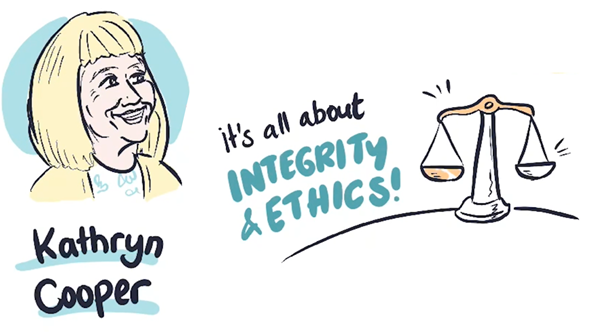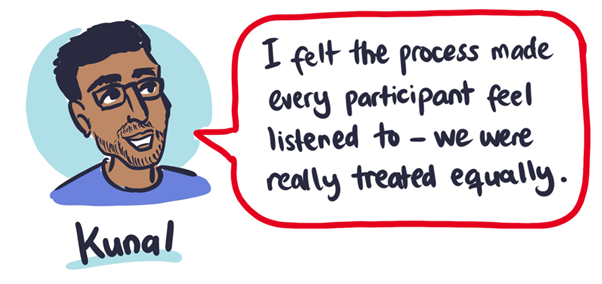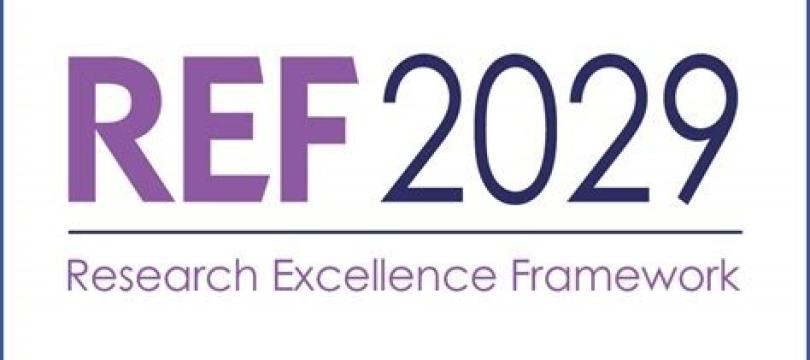The People’s Principles for Public Involvement in R&D
The People’s Vision is a public dialogue, exploring the extent to which members of the public feel agency and ownership in the UK’s research system. Here, NCCPE Co-director, Paul Manners, blogs about his experience of the project, and shares some personal lessons learned.

Meet Kathryn Cooper: a retired nurse, Kathryn was one of 33 members of the public who were recruited to take part in a public dialogue commissioned by CaSE (the Campaign for Science and Engineering). The dialogue was part of CaSE’s Discovery Decade programme which has been working to better understand public attitudes to R&D. The project has involved detailed polling and research and has produced fascinating insights which you can explore on the CaSE site.
But the polling only took CaSE so far: what it revealed was a significant conundrum. Despite all the efforts that the sector has made to share the benefits of R&D with the public, the level of political support that CaSE discovered was only lukewarm: people valued R&D, and could see it was important, but when push came to shove people were not prepared to stand up for it as a priority for investment. The Discovery Decade team realised that they needed to better understand why people felt disconnected, and what – if anything – might help to shift the relationship to one where people felt more ownership.
When the ‘People’s Vision’ project was put out to tender, we couldn’t resist bidding to help deliver it. As you can imagine – given our interest in public engagement – we were very keen to support this kind of committed thoughtful listening exercise. We reached out to the National Centre for Social Research to partner with us, whose centre for deliberative research is a sector-leader in designing deliberative processes.
And that’s when the adventure began. It’s been a roller coaster project – forcing us to confront first-hand some of the structural barriers that make meaningful involvement so hard to realise. But at the same time it has been exhilarating – the dialogue created a safe space for the contributors to ‘dare to dream’ about what could be done to tackle the disconnection CaSE’s work so effectively highlighted.
You can find out more about what happened on the CaSE website and in a short film that we have produced to share some of the key findings. So in this blog I share some of my own learning from this process.
The Tough Stuff
Perhaps the most profound learning for me – and the most challenging – was to recognise the journey the R&D sector still needs to travel to really engage people with research. The NCCPE has been in existence for over 15 years and with our many colleagues and collaborators we have worked hard to make the case for engagement and to support universities to take it more seriously. There are many, wonderful things to celebrate.
However, the CaSE polling revealed that our collective efforts are still failing to reach a critical mass – and the dialogue participants (chosen with great care to be representative of the UK population, and to have a range of attitudes towards R&D) were mainly aligned with these findings. They didn’t think R&D wasn’t important – but felt little meaningful connection to it.
Kathryn put it simply and succinctly, reflecting on how she felt at the start of the process:
I think people see research as experts, people that know, scientists, universities, and [are] perhaps a bit frightened of it, a bit scared; feel that they're going to be out of their depth, they're not going to know what people are talking about. And perhaps they feel that they don't have a contribution to make.
Lightbulb moments
It was interesting to see how views developed once participants were given the chance to meet people working in R&D – funding it, doing it, supporting engagement. And to hear about a host of different projects from across the disciplinary landscape and touching on all kinds of topics, from emotions to energy use.
Kunal was another participant – his day job is for HMRC as a data analyst. Kunal came into the process feeling positive about R&D, but what resolved for him was that he now felt a much deeper understanding and commitment to the role it can play in helping humanity. He reflected:
‘My overall outlook still was positive but it was more reinforced: there was actual reasoning behind it, if you like’
So what next?
The project has developed four People’s Principles that outline how this group felt people could and should be involved in R&D. These reinforce many other good practice principles – but what is particularly exciting about them is that they focus specifically on public involvement in R&D as a whole – rather than on specific areas of research (like health) or specific topics (like AI). Because of this, they provide a powerful platform for the whole R&D sector to mobilise behind – and it is great that an advocacy organisation like CaSE is throwing their weight behind them, and publishing a set of recommendations which they will promote widely.
Do dip into the process – we have made a set of films and written two reports (one describing the process in detail, written by NatCen) and the other summarising CaSE’s takeaways and recommendations.
I thought I should leave Kathryn to have the final word: "People's input must impact the quality of the research, it's all about integrity and ethics. Perhaps some people think they haven't got anything to say, but they do! Even if the researchers don't agree with them".

People's input must impact the quality of the research, it's all about integrity and ethics. Perhaps some people think they haven't got anything to say, but they do! Even if the researchers don't agree with them.

